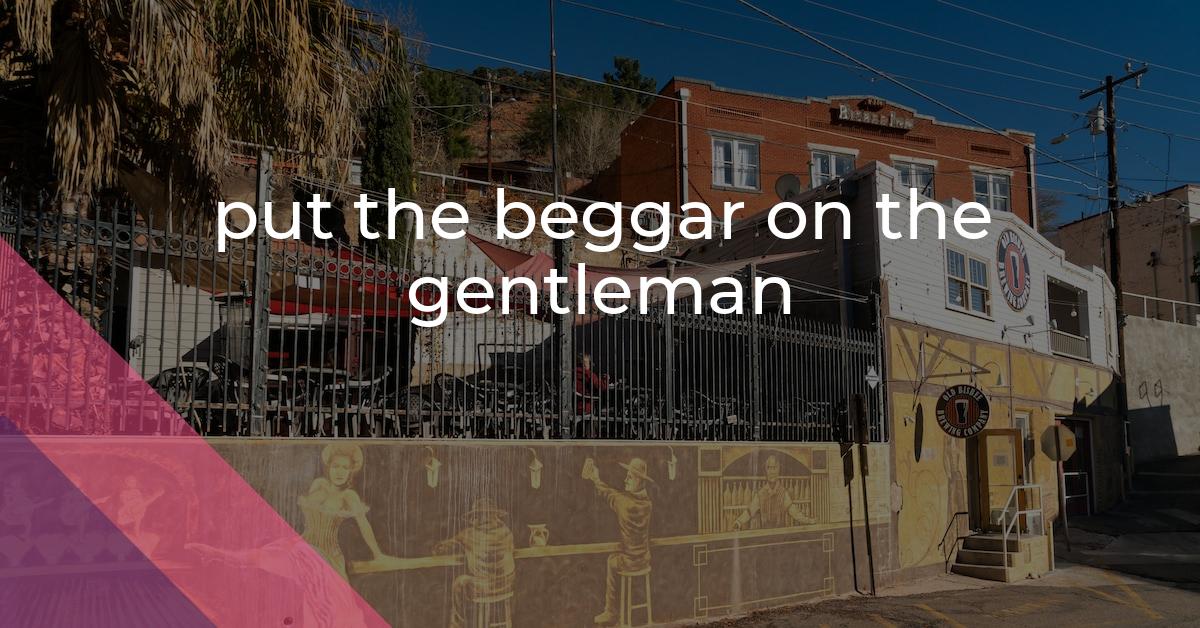put the beggar on the gentleman: Idiom Meaning and Origin
What does ‘put the beggar on the gentleman’ mean?
The idiom "put the beggar on the gentleman" means to dress someone in more expensive or elegant clothing to make them appear wealthier or of a higher social class than they actually are.

Idiom Explorer
An idiom that means someone is very poor and has no money.
The idiom "rob Peter to pay Paul" means to take something away from one person or thing to give it to another, especially when both parties are negatively affected by the transaction.
The idiom "put someone on to" means to introduce or make someone aware of something, usually a person or an idea.
The idiom "put someone in their place" means to assert one's authority or dominance over someone, often by reminding them of their lower status or making them feel inferior.
The idiom "put someone in mind of" means to remind someone of something or someone. It implies that the person or thing being referred to evokes thoughts or memories similar to another person or thing.
The idiom "put on the ritz" means to dress up formally or to behave in a fancy or extravagant manner. It originated from the luxury hotel "The Ritz," known for its opulence and high-class clientele.
Put on the map is an idiom that means to gain recognition or become well-known. It refers to the act of bringing something or someone into public attention, making them more notable or important.
The idiom "put on the dog" means to dress or act in an extremely fancy or extravagant manner, often to show off or impress others.
The idiom "put on frills" means to add unnecessary or excessive decorative details or embellishments to something, typically to make it more attractive or impressive.
Hidden Revelations
The idiom "put the beggar on the gentleman" is a lesser-known and obscure phrase that has its origins in British English. While there is limited information available about its specific meaning and usage, it can be inferred that the expression conveys a sense of reversing social roles or treating someone of lower status as if they were of higher status.
One possible explanation of the idiom is that it relates to the traditional distinction between a beggar, who is typically impoverished and of low social standing, and a gentleman, who is considered well-mannered and of higher social class. By "putting the beggar on the gentleman," the idiom suggests raising the status of the beggar to that of a gentleman, possibly through acts of kindness or generosity.
Another related idiom that comes to mind is "put on the dog." This phrase means to dress or behave in a fancy or extravagant manner to impress others. In the context of "put the beggar on the gentleman," this idiom could be applied to the act of dressing up the beggar, giving them a more refined appearance and treating them as if they were of higher social status.
Similarly, the idiom "put on the ritz" also relates to portraying oneself as more refined or upscale than one actually is. It may involve putting on extravagant airs or engaging in pretentious behavior. When considering "put the beggar on the gentleman," this idiom could be used to describe the act of treating the beggar as if they were sophisticated and elegant, in contrast to their usual appearance or social standing.
Furthermore, the idiom "put someone on to" means to introduce or inform someone about something. In relation to "put the beggar on the gentleman," this idiom might be used to describe the act of acquainting the beggar with the manners, behaviors, and etiquette associated with being a gentleman. By educating the beggar and providing them with the necessary knowledge and skills, they can be "put on to" the ways of a gentleman.
By exploring these related idioms, we can gain a deeper understanding of the nuances and implications of "put the beggar on the gentleman." The phrase speaks to the potential for individuals to transcend their societal roles and stereotypes, and be treated with respect and dignity.
While the meaning and usage of the idiom "put the beggar on the gentleman" may remain somewhat elusive, it offers a unique and thought-provoking glimpse into the complexities of language and human interaction. It challenges us to consider the ways in which we perceive and treat others, and reminds us of the power of idiomatic expressions to capture and convey powerful cultural ideas and values.
Example usage
Examples of how the idiom "put the beggar on the gentleman" can be used in a sentence:
- He is always dressed in expensive suits, but in reality, he is just putting the beggar on the gentleman.
- Don't be fooled by her extravagant lifestyle, she is just putting the beggar on the gentleman.
- They may seem wealthy and successful, but it's all a facade, they are putting the beggar on the gentleman.
More "Etiquette" idioms



